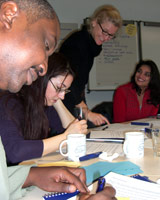UNESCO-supported Boundless Project promotes diversity and cross-border journalism
04-02-2010 (Paris)

Training in Bonn
© DW/UNESCO
Promoting cultural diversity and cross-border journalism is a key objective of the Boundless Project, which provides multimedia and television professionals with the opportunity to participate in the Young Euro-Mediterranean Academy for Intercultural Journalism. 12 young journalists took part in the training hosted by Deutsche Welle in Bonn, Germany, from 30 November to 11 December 2009.
Two years ago the German broadcasting corporation, Westdeutscher Rundfunk, COPEAM and UNESCO initiated the Boundless Project to involve young journalists whose work demonstrated a commitment to diversity and tolerance. Since then, the project strives to promote dialogue and cultural exchange between the north and the south of the Mediterranean, based on the certainty that the media play a major role in shaping our perception of other cultures.
"So far, I must say, the exchange has been very fruitful and inspiring, and I am glad to have met such a variety of interesting colleagues during the visit to Bonn," commented one of the participants of the training, which reflects the atmosphere of the group.
The journalists selected for the Boundless Project 2009 are coming from Germany, Egypt, Lebanon, Sudan, Syria, the Netherlands and Yemen to share experiences and knowledge in film making and TV coverage. The first steps consisted of a workshop on mutual perception and a two-week practical journalism assignment in one of the European partner stations in Berlin, Cologne, Hilversum and Mainz. The last phase, which started in the end of January, sees the different teams researching, shooting and editing their work in one of the Arab partner stations in Beirut, Cairo, Damascus, Khartoum and Sana’a.
"It was very important for UNESCO to support the Boundless Project," says Mogens Schmidt, UNESCO’s Deputy Assistant Director-General for Communication and Information. “Public service media can indeed provide the space for dialogue between cultures, relating them to one another in order to avoid segregation and cultural entrenchment, and thus prevent conflict. Cultural dialogue has taken on a new meaning in the context of globalization and has become a vital means of maintaining peace and world unity. The public service media can contribute to fostering inclusive knowledge societies and human development, and I am glad to offer UNESCO’s support to the programme which brings together young journalists to engage in the important debate of cultural diversity and cross-border journalism,” continues Schmidt.
"So far, I must say, the exchange has been very fruitful and inspiring, and I am glad to have met such a variety of interesting colleagues during the visit to Bonn," commented one of the participants of the training, which reflects the atmosphere of the group.
The journalists selected for the Boundless Project 2009 are coming from Germany, Egypt, Lebanon, Sudan, Syria, the Netherlands and Yemen to share experiences and knowledge in film making and TV coverage. The first steps consisted of a workshop on mutual perception and a two-week practical journalism assignment in one of the European partner stations in Berlin, Cologne, Hilversum and Mainz. The last phase, which started in the end of January, sees the different teams researching, shooting and editing their work in one of the Arab partner stations in Beirut, Cairo, Damascus, Khartoum and Sana’a.
"It was very important for UNESCO to support the Boundless Project," says Mogens Schmidt, UNESCO’s Deputy Assistant Director-General for Communication and Information. “Public service media can indeed provide the space for dialogue between cultures, relating them to one another in order to avoid segregation and cultural entrenchment, and thus prevent conflict. Cultural dialogue has taken on a new meaning in the context of globalization and has become a vital means of maintaining peace and world unity. The public service media can contribute to fostering inclusive knowledge societies and human development, and I am glad to offer UNESCO’s support to the programme which brings together young journalists to engage in the important debate of cultural diversity and cross-border journalism,” continues Schmidt.

Training in Bonn
© DW/UNESCO

Training in Bonn
© DW/UNESCO
Related themes/countries
· Egypt
· Germany
· Lebanon
· Netherlands
· Syrian Arab Republic
· Sudan
· Yemen
· Training of Media Professionals
· Weekly newsletter
Share this story:
Contact information
- UNESCO
Source














